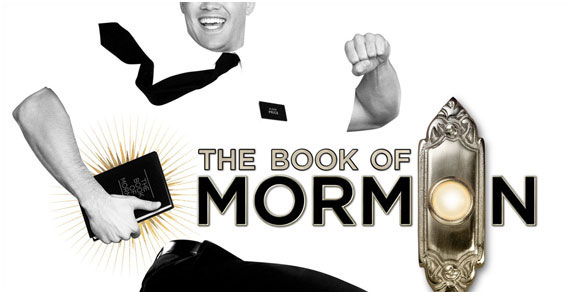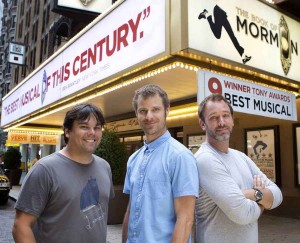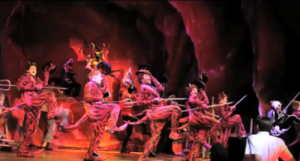
The Book of Mormon Debuts in Denver (and leaves one thinking politics)
You and me, but mostly me
Are gonna change the world forever
‘Cause I can do most everything
(And I can stand next to you and watch)
And now we’re seeing eye to eye
It’s so great, we can agree
That Heavenly Father has chosen you and me
Just mostly me.”
These are lyrics from “You and Me (But Mostly Me)” the third number in Act 1 of The Book of Mormon, which had its touring debut in Denver on August 14. Winner of nine Tony Awards in 2011, The Book of Mormon was written by Colorado’s own Trey Parker and Matt Stone (creators of South Park) with Robert Lopez (composer of Avenue Q).

The play is about two naïve Mormon missionaries, Elder Kevin Price and Elder Arnold Cunningham, an unlikely duo paired together and sent to Uganda for their mission. Price is the a-star, all-American, Mormon hero of his missionary class who dreams of going to Orlando to save souls. Cunningham is the overweight, awkward sidekick who confesses he hasn’t read the Book of Mormon (the guiding testament of the Church of Jesus Christ of Latter-Day Saints). Price is certain he is destined to do something incredible while Cunningham is happy to have a best friend, albeit someone he just met.
(I couldn’t help but think of Mitt Romney. Perhaps it was Gavin Creel’s square jaw and All-American looks—not the message of the song.)
Uganda is not Orlando (just like being president is not organizing the Olympics or raiding corporations for their profits) and the pair are robbed when they first arrive and must face the horrific realities of warlords, AIDS, famine, poverty and a village that sings a happy tune, in order to cope — “hasa diga eebowai.” Price and Cunningham join in the singing, but are horrified to learn the translation is “Fuck you, God.” They are taken to their living quarters and meet their fellow missionaries who have been unable to convert anyone in the village to Mormonism. A bit shell-shocked by their experience they receive advice from Elder McKinley, the district leader, who teaches them to turn off their negative and upsetting feelings (just as he has with his own repressed homosexual thoughts) inviting them to “turn it off like a light switch,” in a hilarious chorus line bit. (Wow, the entire Republican party platform could be defined in this song! Let’s pretend there are no poor people, no gays, no women, and no rape. Just turn it off and legislate it away!)
In spite of the challenges, Price believes he can succeed where the others have failed (if I tell the stories they will convert. If I promote the same trickle down economics that haven’t worked for decades, the economy will miraculously recover!) Price launches into a teaching about Joseph Smith, the founder of the LDS Church.
“The blonde-haired, blue-eyed voice of God
He didn’t come from the Middle East
Like those other holy men
No, God’s favorite prophet was All-American”
The song tells a version of Mormon history that becomes a tribute by Price to himself.
“Have you heard of the All-American Prophet?
(Kevin Price)
The next in line to be the voice of God
(My best friend)
He’s gonna do something incredible
And be Joseph Smith again
Because Kevin Price the Prophet is All-American.”
(I’m white. I’m not a Muslim (like Obama!)
Will the American people respond the way the villagers do? They show no interest in Price, for them religion is useless and Price is arrogant and annoying.
The warlord, General Butt-Fucking-Naked arrives in the village and demands the circumcision of all female villagers (his paranoia has led him to believe that all the clitorises in the village will “power-up” and destroy him). (A bit like Todd Akin!) Butt-Fucking-Naked then executes a random villager to silence their protests. (One wonders with the Patriot Act, the excessive gun violence in America and those who believe it is their right to silence those who disagree with them, how long before this happens in America?)
Shocked by the execution and the dark reality of Africa, (hmm, the dark realities of being president seem to turn hairs gray, faces paunchy, eyes saggy) Price decides to abandon his mission and requests a transfer to Orlando, dumping Cunningham in the process. Cunningham decides to “Man Up” and in Act II he reaches out again to the villagers, but with a limited knowledge of the Book of Mormon he embellishes his stories with characters from Star Wars and The Lord of the Rings trying to relate to the Ugandan villagers. (Anyone who has read religious texts or studied sacred books realizes that it’s all just literature and stories anyway.)

Price has a “Spooky Mormon Hell Dream” (the kind many of us who grew up in fanatical religions had) and wakes up from the nightmare recommitted to his calling and sets off on the “mission he was born to do” – confronting General Butt-Fucking-Naked—determined to convert him to Mormonism. (Hmm. Do you think Romney might believe that by becoming president of the United States he can convert the whole country to his religion?)
Meanwhile Cunningham is successful in his conversion to Mormonism of ten villagers who are baptized. The Elders celebrate their oneness with the people with the song “I Am Africa.” (A hilarious spoof that pokes fun of Disney and Bono equally.)
Price is not so lucky and has the Book of Mormon shoved up his rectum by the General. (I guess we’ll have to wait for November 14 to see who gets what shoved where!).
To honor the visiting Mission President, the villagers perform a pageant telling the story of “Joseph Smith, the American Moses” which reflects the distortions put forth by Cunningham. It’s sidesplitting hysterical. The Angel Moroni comes down from the Starship Enterprise to deliver the golden plates. And when the Mormons go west and find Sal Tlay Ka Siti they dance with Ewoks and are greeted by Jesus. You get the idea. But the message throughout is that they help each other, be nice to each other and stick together.
But the message is lost on the Mission President who is appalled and rejects the villagers telling them they are not Mormon. Cunningham is depressed. However, Price has an epiphany and realizes that although the scriptures are important, what’s more important is ensuring that religion helps people. Price reconciles with Cunningham and they agree to remain in Africa and help the Ugandans together. (Ah, here is where fiction parts with reality. I just don’t see Romney having an epiphany and changing the Republican party. They are too dogmatic.)
General Butt-Fucking-Naked is about to take over the village when Price returns, the villagers believe he is risen from the dead after being eaten by lions (There is a resurrection in dozens of sacred texts and faiths, the spiritual leader dies and returns). Price and Cunningham drive the General away who believes that they are the undead and Price threatens to turn him into a lesbian (the ultimate horror for someone afraid of the clitoris). (Perhaps all those white men in Congress who want to take away women’s birth control and choice should be turned into lesbians. They might like it.)
In the end Price, Cunningham and the villagers come together and evangelize the Book of Arnold which teaches that we should all work together to take care of this planet, not aspire to being rewarded with our own planet in heaven like Kolob, the planet on which God lives (one of the precepts of the Mormon faith). The show ends with a reprise of “Hello” a catchy, doorbell ringing, proselytizing tune featuring the villagers, male and female as the missionaries.
(What? Women missionaries? Not seen in the Mormon church! But hey, it was 1978 before God changed his mind about black people and spoke directly to the president of the LDS Church telling him they were not the cursed descendants of Cain and enemy to Mormons! See, people can change! Maybe someday God will allow women to be missionaries, too!)
As the tag line says, The Book of Mormon is “God’s favorite musical.” It’s my favorite too.
